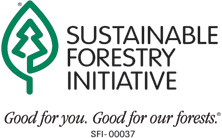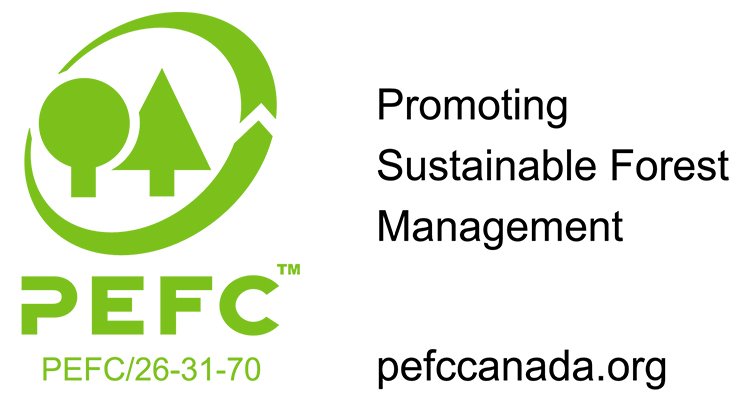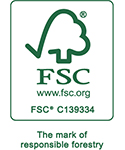Ensuring the traceability of 100% of the fiber supply is of paramount importance in the marketplace – and to Resolute Forest Products. The quality of fiber, conservation priorities and sound environmental management of the forests in our care are all important components of chain of custody. Through our tracking systems, we also closely monitor issues such as risks of illegal logging, conflict logging and illegal harvesting that could negatively impact endangered species or First Nation communities.
Chain of Custody Certification
Chain of custody (CoC) is the process through which the company demonstrates it has the systems and controls necessary to track the source of certified fiber in its products. Third-party certification provides the assurance that robust systems identifying the source of the fiber or wood used are in place.
All of Resolute’s pulp, paper and tissue mills as well as wood products facilities have fiber tracking systems, and 100% of these are third-party certified according to one or more of the following internationally recognized chain of custody standards:
- Sustainable Forestry Initiative® (SFI®)
- Programme for the Endorsement of Forest Certification (PEFC)
- Forest Stewardship Council® (FSC®)



Internal and external audits are conducted at each of our operations on an annual basis. Discrepancies identified during the audit process are corrected and re-evaluated in subsequent audits. The constant evolution of CoC standards requires that Resolute comply with the latest science-based recommendations and requirements for our fiber sourcing areas and operations. CoC certifications for each of our operations are renewed on a five-year basis. We are committed to maintaining internationally recognized CoC standards across 100% of our operations, and for 2026, we have set a target to increase externally sourced fiber that is third-party certified to 75%.
Tracing our Products to the Source
For both our internal and external wood and fiber, 100% is sourced in accordance with SFI fiber sourcing requirements, PEFC CoC due diligence requirements or the FSC Controlled Wood standard, and in some cases a combination of these standards. All of these require 100% of the fiber processed meet minimum due diligence requirements related to risks of illegal logging and other important sustainability issues. This enables us to confirm to manufacturers and traders that they have avoided timber and timber products from unacceptable sources. Depending on the tracking system, additional requirements may apply that relate to high conservation values, conversion of forests to non-forest uses, propagation or use of genetically modified trees, corruption, indigenous rights and/or workers’ rights.
As a certified company, Resolute must take appropriate steps to ensure that it, and the suppliers and woodlot owners it sources from, all abide by a number of state, provincial and federal regulations, as well as voluntary best management practices that protect important ecosystem services, including water quality, habitat for endangered species, and suitability for recreation. Certifications, such as SFI fiber sourcing, require us to work only with suppliers who are trained in the use of best management practices for timber harvesting – and are committed to implementing these practices. This helps ensure environmental concerns are addressed within harvesting areas, even though non-industrial private forest landowners may not themselves be certified.
At our operations in the United States and Canada, deliveries of recovered fiber, roundwood and chips are tracked at the operational, regional and corporate levels with sophisticated software systems that convert on-site readings from truck weighing scales into accounts payable information, reports and other internal data uses. These systems are necessary to keep track of the approximately 700 external suppliers and more than $500 million in annual payments. Internal financial audits every two to three years maintain the continued robust reporting systems outlined in Resolute’s procurement policies.
Highly Integrated Value Chain
In 2022, woodlands managed by the company provided approximately 68% of our required supply of wood fiber (chips and roundwood) for pulp and paper, with the remaining 32% purchased from external sources. Our Canadian sawmills source 100% of their wood from forests in Canada – mostly from Resolute’s managed forests (over 90%), and some from external suppliers. Fiber from our managed forests is harvested by employees and contractors in accordance with our carefully developed forest management plans and all applicable regulations. Virgin fiber harvested from other crown lands is also occasionally purchased from distributors. With respect to our U.S. sawmills, 100% of the fiber is sourced from American forests by external suppliers.
In 2023, a total of 65% of the fiber input for our pulp and paper mills consisted of sawmill by-products (wood chips) from Resolute’s own wood products operations and other facilities. An additional 3% of the total fiber used came from recovered paper collected and processed by external suppliers, as well as paper waste collected directly from commercial printing companies.
In Quebec, we purchase virgin fiber from private woodlot owners through brokers who maintain chain of custody tracking. In Ontario, virgin fiber purchases are made directly from private woodlot owners, while in the U.S., third-party suppliers work with private owners to harvest and deliver most of the fiber used at our operations.
At Resolute, 100% of the woodlands we harvest are regenerated through natural regeneration and tree planting. For more information on our approach to sustainable forest management, please visit our Forest Certification page.